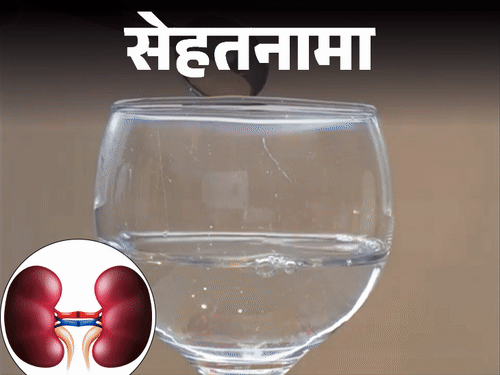According to a report by the Central Ground Water Authority, the amount of salt in Delhi’s groundwater is higher than normal. In the samples analyzed, more than 25% of the water was found to be salty. In this area, Delhi is second after Rajasthan, 30% of samples there contain salt water.
Obviously, people generally use this water for drinking and cooking. This means that people in these regions of Delhi and Rajasthan are consuming more salt than necessary.
This situation is not limited to Delhi and Rajasthan. According to the World Health Organization (WHO), almost everyone in the world consumes twice as much salt as necessary every day. Around 19 million people die each year from diseases caused by excessive salt consumption.
so today ‘health record’ I’ll talk about what happens if you eat too much salt. You will also learn that-
According to the WHO, how much salt should we consume daily? What happens to the body when you consume too much salt? How can we reduce the amount of salt in foods?
People eat twice as much salt as necessary
According to the World Health Organization, a healthy person should consume less than 5 grams of salt (less than 2,000 mg of sodium) per day. While almost everyone in the world consumes more than 10 grams of salt every day.
According to the Indian Council of Medical Research (ICMR), an average Indian adult consumes 8 grams of salt, which is 3 grams more than the norm set by WHO. This harms our health.
Millions of deaths occur each year due to excessive salt consumption.
A pinch of salt changes the taste of our food. A little too much salt can spoil the taste of food. The World Health Organization says that this salt also impairs the taste of health.
Eating too much salt can cause high blood pressure. It can also lead to risk of heart disease, gastric cancer, and kidney disease. All these diseases invite death.
Too much salt is the enemy of the heart and kidneys.
Consuming too much salt increases the amount of sodium in our blood. The body needs more water to dilute itself. Drinking more water increases blood volume. This increases pressure on the blood vessels and the heart. Our body knows that excess salt is harmful to the body. Therefore, the kidney immediately begins filtering to balance it. He must work very hard in this job. Doubling the amount of salt means its work also doubles. When the kidneys become tired while working, they release salt into the blood, which increases blood volume. Blood pressure increases. Under these conditions, the heart has to work harder to pump. As a result, the risk of heart disease and stroke increases. This can lead to kidney stones and also increases the risk of kidney disease.
According to naturopathy, that is to say natural medicine, all our food should come from plants. Whereas the salt we use in food does not come from plants. To be healthy, you need to stop eating salt or eat less of it.
It is important to reduce salt in foods
We constantly talk about how much salt is in our food. In such a situation, this question must come to your mind: the amount of salt does not seem to be much while eating. Indeed, our taste buds have evolved with a diet high in salt since childhood. That’s why it seems normal to us. Even though it is more than the body needs and continually harms us.
If the use of salt is gradually reduced in the daily diet, there will not be much difference in taste and it will also become a habit according to its taste. Wafers, ketchup and sauces contain more salt than food. Apart from this, fast food also contains too much salt than necessary. It is therefore important to avoid them above all.
Understand in the chart what are the 5 things to keep in mind for this.
Vegetables and legumes already contain salt
We don’t need to add salt even to vegetables or legumes. Salt is naturally present there. In fact, nature prepares everything in such a way that we do not need to add anything to it. Despite this, if you need to add something for taste, you can add herbs like coriander, oregano. All the salt we need to stay healthy comes from fruits and vegetables. Understand it this way, if someone eats half a kilo of fruits and vegetables a day, it meets the salt needs of our body. For this, eating salad can be a good option. Cucumber, tomato, carrot and seasonal fruits can be stored there. Adequate amount of salt is present in all these things. Include green leafy vegetables, spinach, cabbage, cauliflower, onion, tomato, etc. in your diet. These also contain salt. Likewise, legumes naturally contain salt.

